The Role of Values in Wisdom
by Copthorne Macdonald
British philosopher Nicholas Maxwell has called wisdom "the capacity to realize what is of value in life for oneself and others." The embracing of "high" or "superior" values is a hallmark of wisdom. High values have two roles in the lives of wise people. First, they can provide illuminating slants on the data of life. Second, they guide the decision-making process toward wiser decisions.
Decision making involves hardware and software, and let's begin with the hardware.
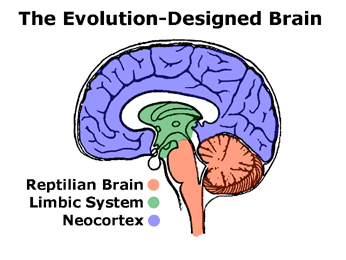
The human brain can be divided into three major subsystems, and each dates back to a different evolutionary era. The most rudimentary part of our brain is what I call here the reptilian brain. Its basic design evolved in fish, amphibians, and reptiles. It is the part of the brain that controls basic bodily functions such as heart rate, breathing, temperature, and balance. It is hardwired to keep us alive, and sometimes continues to do that even in so-called "brain dead" people. That primitive value, territoriality, also appears to be hardwired into the reptilian brain.
The limbic system arrived with the first mammals. It helped mammals to survive because it allowed them to remember experiences, and it linked those experiences to pleasant and unpleasant emotions. In humans, the limbic system continues to be involved with memory and emotion.
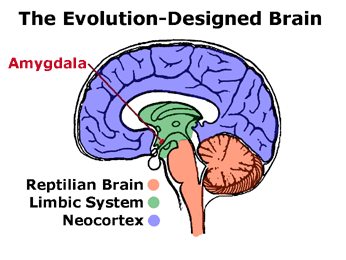
One key part of the limbic system is the amygdala. This part of the brain continuously monitors sensory inputs, and has a hardwired program that looks for threats. As psychologist Daniel Goleman described it, the Amygdala challenges "every sensation, every perception, but with one kind of question in mind, the most primitive: 'Is this something I hate? That hurts me? Something I fear? If so — if the moment at hand somehow draws a 'Yes' — the amygdala reacts instantaneously, like a neural tripwire, telegraphing a message of crisis to all parts of the brain."
Our potential savior from a hard-programmed, reactive life is the neocortex. It's evolution began with the higher mammals, and reached its highest level of complexity in human beings. Unlike the hardwired parts of the brain, the programming of the neocortex can be changed through various kinds of learning. Also, neural connections exist from it to the ancient regions of the brain. Because of these, calls for extreme action from the amygdala and other ancient parts of the brain can be overridden by the neocortex. The overriding only happens, however, if the habit has been developed not to react instantaneously to the impulse to act. Time is needed for the neocortex to complete its slower — but much more sophisticated — analysis of the situation.
The way brain processes and their values work together to make our decisions and control our behavior is similar to the way a computer's hardware and software work together to make the computer's decisions and control its outputs. Human decision-making is a largely unconscious process in which a constantly shifting hierarchy of internalized values interacts with a constantly shifting set of perceived circumstances and retrieved memories.
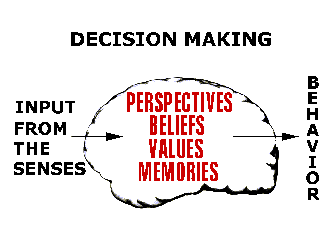
As we've noted, the brain is the hardware of our behavioral control system. The elements in red constitute the heart of the software. They work together to make our decisions. Information about the immediate situation is presented to the brain by our senses. The brain also has access to memories of other situations and other decisions as well as previously acquired knowledge and perspectives. At the heart of the process is our hierarchy of internalized values. In ways we don't yet understand, the brain takes these informational elements and arrives at a response to the situation — a decision to act in some particular way, or not to act at all.
Playing a central role in all this are the values. Roger Sperry, who won a Nobel Prize for his split-brain research, put it this way:
Human values, in addition to their commonly recognized significance from a personal, religious, or philosophic standpoint, can also be viewed objectively as universal determinants in all human decision making. All decisions boil down to a choice among alternatives of what is most valued, for whatever reasons, and are determined by the particular value system that prevails. Human value priorities, viewed thus in objective control-system theory, stand out as the most strategically powerful causal control now shaping world events. More than any other causal system with which science now concerns itself, it is variables in human value systems that will determine the future.
I would add a corollary: superior values, "the values of the wise," produce superior decisions and superior behavior.
What are those superior values? There are many lists, and elsewhere you will find a compilation of several lists. Here, we'll look at just one: the Being-Values of the self-actualizing people that Abraham Maslow studied.
The self-actualizing and ego-transcending people that Abraham Maslow studied were wise people. And Maslow's reports on their behavior and mindsets tell us a lot about the nature of wisdom and the values that underlie it. Maslow's self-actualizers focused on concerns outside of themselves; they liked solitude and privacy more than the average person, and they tended to be more detached than ordinary from the dictates and expectations of their culture. They were inner-directed people. They were creative, too, and appreciated the world around them with a sense of awe and wonder. In love relationships they respected the other's individuality and felt joy at the other's successes. They gave more love than most people, and needed less. Below is a set of values that were central to their lives. Maslow called them the Being-Values, or B-Values.
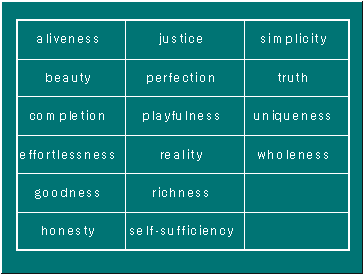
One final word about values. In my comments about values I've been referring to a person's deep down, internalized, operational values. These are not necessarily the same as someone's professed values. The internalized values reveal themselves in behavior. The professed values may exist only in words. To understand what values are really in control, we can work back from behavior — our own behavior and that of other people.
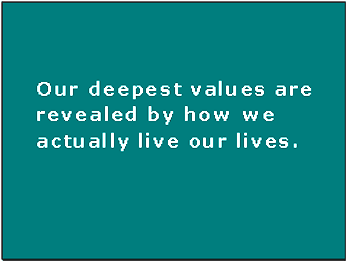
Pleasing to us or not, there it is.
Once we have become clear about the values by which we would like to live — the values we want to make truly our own in a deep and powerful way — we face the question of how we do that. Somehow we must move these values from our head to our heart and our guts. In psychological terms, we must internalize them. Sometimes a guiding aphorism can click at a deep level, define a path, and start us down it. Other approaches involve coming to a clearer understanding about how we make decisions, choosing the influences to which we subject ourselves, and practicing wise behavior.
Copthorne Macdonald is a writer and independent scholar. He has written 8 books (3 of them on aspects of wisdom) and many articles, reviews, and column installments. Since 1995 he has tended THE WISDOM PAGE — a website devoted to wisdom resources at http://www.wisdompage.com/